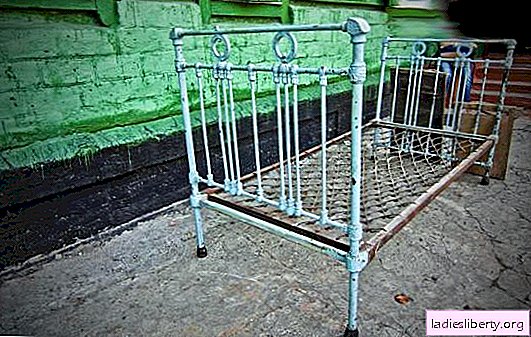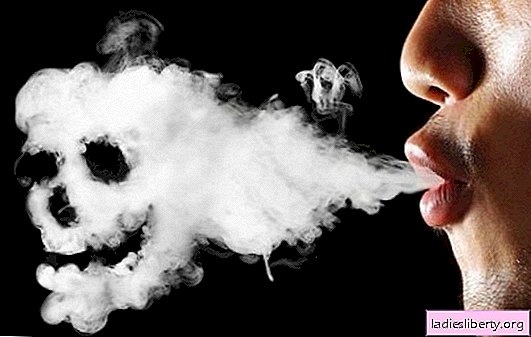
For many, Corvalol is a first aid for discomfort in the heart, anxiety, depression, spasms in the intestines. A few drops of the medicine are enough to relieve nervous tension, however, in an effort to achieve a better effect, the dose is increased. With the uncontrolled administration of the drug, symptoms of an overdose of Corvalol occur, having noticed that the victim must be immediately helped.
What is the effect of Corvalol?
The composition of the drug includes components:
• Menthol - promotes vasodilation, has antispasmodic properties. If ingested in an amount of more than 25 mg, it can cause constipation.
• Ethyl ester of α-bromisovalerianic acid - has a calming effect like valerian.
• Phenobarbital - depressing effect on the nervous system. In Russia, the component is included in the List of narcotic substances.
Corvalol, containing phenobarbital, is freely sold in pharmacies due to an insignificant amount of a psychotropic narcotic substance (1.82%). The basis of the drug is ethyl alcohol (96%) and water.
Note! Some countries (USA, Lithuania) banned import of Corvalol due to the presence of the narcotic component. The drug is widely known within the post-Soviet space, the countries of Western Europe use its analogue, Valocordin.
Corvalol is available in drops and tablets, is widely used due to its low price. The cost of drops on average is 40-50 rubles. for a bottle of 50 ml., tablets (20 pcs.) cost 120-150 rubles.
Considering the drug is harmless, users ignore the instructions and take the medicine, determining the desired dose on their own. This approach leads to an overdose of Corvalol, what to do is a legitimate question after uncontrolled administration of the drug.
Safe and Toxic Dose of Corvalol
Symptoms of an overdose of corvalol are more often observed in children who are given a remedy to calm and improve sleep, as well as in the elderly.
The dose is considered safe:
• For adults - from 15 to 30 drops three times a day on an empty stomach.
• With an increase in heart rate from 100 beats / min. (tachycardia) dose can be increased to 50 drops.
• For children - from 3 to 15 drops / day. depending on well-being, diagnosis.
The maximum daily dose of Corvalol, which does not cause poisoning in adults, is 150 drops per day.
The drug can cause death if taken in the amount of:
• 20 g;
• at the rate of 0.1-0.3 g per 1 kg of weight. If a person's weight is 70 kg, for him the average potentially dangerous dose will be: 70X0.2 g = 14 g, which is equal to about 18 ml.
Note! The highest risk of symptoms of Corvalol overdose in people with hypersensitivity to the drug, impaired renal function, liver. Taking the minimum dose may cause them to show signs of intoxication. It is better for such people to refrain from treatment with Corvalol.
Symptoms of Corvalol overdose
Malaise after taking the medicine may appear in the following cases:
• when using 10 ml, that is, ½ bottle one-time or at small intervals;
• when the drug enters the body simultaneously with alcohol, antidepressants and tranquilizers. These substances enhance the effect of Corvalol, which is fraught with the development of symptoms of an overdose.
For a mild form of intoxication, signs are characteristic:
• weakness and drowsiness, slight dizziness;
• inability to concentrate;
• difficulties with speaking words;
• muscle weakness.
Note! With a mild degree of overdose, there are no disturbances in the work of the heart, respiratory system.
An overdose of moderate severity is characterized by signs:
• prolonged sleep, during which a person is very difficult to wake up. The victim does not respond to sounds, continues to sleep when the body position changes;
• increased heart rate and decreased blood pressure;
• involuntary salivation;
• weakness in the muscles, lack of voluntary movements (paresis);
• dilated pupils.
Together, these symptoms indicate the development of superficial coma. The victim has no life-threatening violations yet.
Severe overdose - a condition threatening death. Characteristic symptoms:
• unconscious state of the victim;
• lack of response to external stimuli;
• signs of heart failure: shortness of breath, decreased diuresis, swelling in the feet and ankles, cough, increased heart rate;
• low blood pressure;
• twitching of body parts caused by cramps;
• a decrease in body temperature in adults and an increase in children.
This condition is called a "barbituric" coma. Without timely medical assistance, a fatal outcome is likely.
There is also the concept of a "chronic" overdose. It occurs when the dose of the drug is constantly exceeded. The need to take a larger volume of medication is caused by the addiction of the body. To achieve a tangible therapeutic effect, patients require more and more Corvalol.
Chronic overdose is recognized by symptoms;
• depressed state, indifference to events;
• confusion;
• the appearance of acne;
• inflammation of the nasal mucosa (rhinitis) or eyes (conjunctivitis).
Having noticed the first signs of a chronic overdose, Corvalol should be discontinued.
Another danger to patients is the addictive effect. Even a small dose of a narcotic substance leads to addiction. You can recognize it this way: before taking the drug, a person is depressed, feels tired, has unpredictable behavior, is unsure of himself, but after taking Corvalol, he becomes calm and cheerful. The presence of such an effect requires discontinuation of the drug.
Corvalol overdose - what to do?
Due to the availability and prevalence of the drug, you need to know the rules for helping with Corvalol overdose: what to do first, what drugs to take, when should I go to the hospital?
Noticing a person has signs of mild poisoning by Corvalol, it is necessary:
1. Talk with the victim, not letting him fall asleep. Clarify when and to what extent the medicine was drunk.
2. Carry out a gastric lavage: give the patient to drink 1 liter of water and induce vomiting by pressing fingers on the root of the tongue. To remove excess Corvalol, carry out the procedure until the liquid at the outlet becomes clear.
3. Give sorbent - a drug that will prevent the absorption of Corvalol into the bloodstream. For this purpose, use: activated carbon, for adults - up to 30 g 3-4 times / day., For children - 0.5 g / 1 kg of body weight; Enterosgel - 1 tbsp. gel diluted in 2 tbsp. water, give the victim 3 times / day .; Enterosorb - with ½ tbsp. dilute water 5 g of the drug, give three times a day.
4. Make an enema to cleanse the intestines.
After emergency measures to rescue the victim, call an ambulance, as a person’s condition may worsen.
With symptoms of an overdose of moderate, severe degree, first of all it is necessary to call an ambulance. While waiting for events:
• put the victim on his side;
• unfasten tight clothing;
• check the pulse on the wrist, in the neck;
• make sure that the victim is breathing with his head on his chest. If there are no signs of life, immediately perform an indirect heart massage and make artificial respiration.
A timely reaction to the manifestation of signs of intoxication can save a person's life.
Corvalol overdose treatment in a hospital
Corvalol has an antidote - Bemegrid. The drug is effective for mild overdose, is administered intravenously when the victim enters the hospital.
In case of severe poisoning, the patient is connected to a ventilator, glucose and sodium chloride solutions are injected into the blood, diuretics are given.
If the concentration of phenobarbital in the blood is high, and the patient's condition is serious, a hemodialysis procedure is performed.
Effects
The severity of the negative consequences of Corvalol intoxication depends on the amount of the drug taken, the age of the patient, the work of internal organs.
With mild poisoning, the development of allergic reactions is most often observed. Severe poisoning is fraught with the development of pathologies:
• renal, liver, heart failure;
• heart attack, stroke;
• paralysis;
• violations of the central nervous system.
Most poisoning is associated with uncontrolled intake of seemingly harmless drugs. Corvalol is a medicine with a narcotic component, therefore, it must be used strictly according to the instructions and in cases of emergency.











